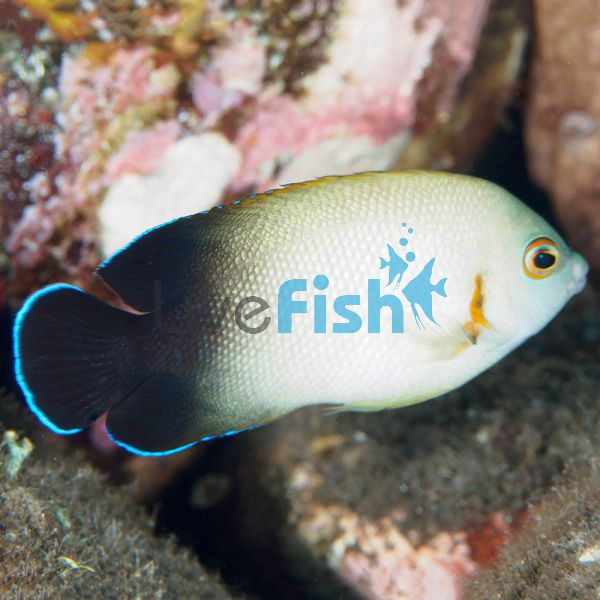Pearlscale Angelfish - Medium
The back third of the Pearlscale Angelfish is a dark black colour that fades into an extremely light grey towards the front. They have a thin neon blue lining to the fins which really make them stand out. The light grey scales have white centres which resemble the colouring of pearls which is where they get their name.
Pearlscale Angelfish
The back third of the Pearlscale Angelfish is a dark black colour that fades into an extremely light grey towards the front. They have a thin neon blue lining to the fins which really make them stand out. The light grey scales have white centres which resemble the colouring of pearls which is where they get their name.
There is no colour difference between the sexes, although the males are considerably larger. No success has been had when attempting to breed this species in captivity. All Pearlscale Angelfish start their life as females and the larger more dominant one in the group will change sex into the male of the group. This sex change can also be reversed if the situation arises making this species of fish protogynous hermaphrodites.
These fish may be quite shy when first added to the tank but given time should become more outgoing and lively. Take caution when handling them or if using a net as they have sharp spines close to their cheek gills which can easily damage both you and the fish.
This species is originally from all over the Western Pacific region ranging from Sumatra to Japan and even as far over as the Christmas Islands. They can normally be found in monogamous pairs around shallow lagoons at depths down to 25 metres.
Tank Recommendations for Pearlscale Angelfish
The smallest tank size for this species is 190 litres as they are not suitable for small tanks due to becoming more aggressive with less space. They also need plenty of live rock with algae to graze upon. They are best suited to fish only environments but can be kept in a reef setting with caution as they have been known to nip at stony and soft coral, especially if they are underfed. They will be much happier if you provide them with plenty of hidden spaces and crevices as well.
Suitable Tank Buddies
The Pearlscale Angelfish is a semi-aggressive species and should only be added into well-established tanks last to avoid them harassing new fish. Only keep with another Pearlscale Angelfish and other non-dwarf angel species for this reason too..
Usually Compatible
This species will get along fine with large species of Angelfish as well as Boxfish and Blennies. Butterflies, Clownfish and Damselfish are great options too. You will not have any problems with Hawkfish, Goatfish and Parrotfish. Pufferfish, Tangs and Squirrelfish are also other wonderful tank buddies.
Sometime Compatible
Take care when selecting which live corals to add into the tank. Caution should be used when attempting to keep with species such as Rays, Triggerfish and Wrasses. Lionfish, Eels and Batfish should be watched carefully as well. Frogfish and Groupers should only be chosen if they can't fit your Dwarf Angelfish into their mouths.
Rarely Compatible
Sharks will almost certainly hunt and prey upon this species so avoid housing them together. Smaller, more docile creatures such as Pipefish and Seahorses may become too frightened in the presence of these lively Dwarfs Angelfish so don't keep them in the same tank either.
Feeding Your Pearlscale Angelfish
These fish are omnivores but will spend most of their time feeding on naturally occurring algae on rocks and other tank decorations. They will also accept a range of frozen foods such as Mysis and brine shrimp along with frozen angelfish preparations. If supplying flake foods be sure that it contains at least some form of algae or spirulina. Feed them at least twice a day as it is very easy to underfeed this species especially if there is insufficient algae growth in the tank.
| Scientific Name | Centropyge Vroliki |
|---|---|
| Care Level | Moderate |
| Common Names | The Pearlscale Angelfish is also known as the Halfback Dwarf Angel. |
| Diet | Omnivore |
| Fish Family | Pomacanthidae |
| Lifespan (years) | 6 |
| Max. Length (cm) | 13 |
| Min. Tank Volume (l) | 190 |
| Origin | West Pacific |
| Reef Safe | With Caution |
| Sociability | Semi-aggressive |
| Venomous | No |
| Water Conditions | 22-27°C, dKH 8-12, pH 8.0-8.5, sg 1.020-1.027 |




